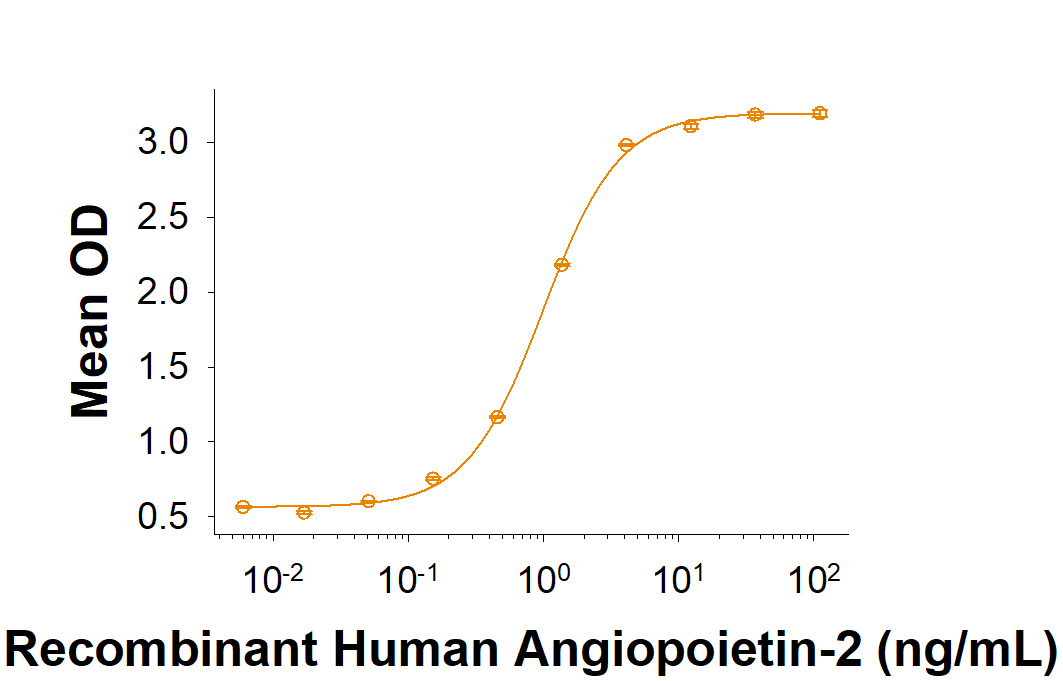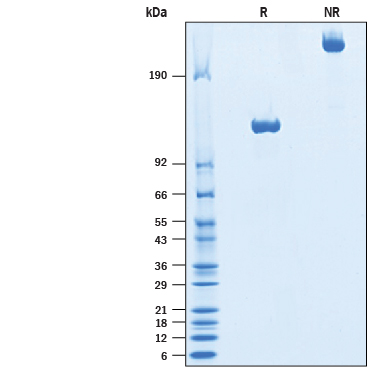Recombinant Canine Tie-2 Fc Chimera Protein, CF Summary
Product Specifications
| Canine Tie-2 (Ala23-Lys746) Accession # XP_005626754.1 | IEGRMD | Human IgG1 (Pro100-Lys330) |
| N-terminus | C-terminus | |
Analysis
Product Datasheets
Carrier Free
CF stands for Carrier Free (CF). We typically add Bovine Serum Albumin (BSA) as a carrier protein to our recombinant proteins. Adding a carrier protein enhances protein stability, increases shelf-life, and allows the recombinant protein to be stored at a more dilute concentration. The carrier free version does not contain BSA.
In general, we advise purchasing the recombinant protein with BSA for use in cell or tissue culture, or as an ELISA standard. In contrast, the carrier free protein is recommended for applications, in which the presence of BSA could interfere.
10720-T2
| Formulation | Lyophilized from a 0.2 μm filtered solution in PBS with Trehalose. |
| Reconstitution | Reconstitute at 500 μg/mL in PBS. |
| Shipping | The product is shipped at ambient temperature. Upon receipt, store it immediately at the temperature recommended below. |
| Stability & Storage: | Use a manual defrost freezer and avoid repeated freeze-thaw cycles.
|
Scientific Data
 View Larger
View Larger
When Recombinant Canine Tie-2 Fc Chimera (Catalog # 10720-T2) is immobilized at 0.5 µg/mL (100 µL/well), Recombinant Human Angiopoietin-2 (623-AN) binds with an ED50 of 0.40-3.60 ng/mL.
 View Larger
View Larger
2 μg/lane of Recombinant Canine Tie-2 Fc Chimera (Catalog # 10720-T2) was resolved with SDS-PAGE under reducing (R) and non-reducing (NR) conditions and visualized by Coomassie® Blue staining, showing bands at 115-135 kDa and 230-270 kDa, respectively.
Reconstitution Calculator
Background: Tie-2
Tie-2, also known as Angiopoietin-1 receptor and Tek, along with the closely related Tie1, are vascular-specific receptor tyrosine kinases (RTKs) involved in angiogenesis, vascular development, and hematopoiesis (1, 2). The Tie molecules are characterized by three immunoglobulin-like domains, three epidermal growth factor (EGF)-like domains, and three fibronectin type III-like repeats in the extracellular domain (ECD) and a split tyrosine kinase domain in the cytoplasmic region (3, 4). The ECD of canine Tie-2 shares 94% amino acid sequence identity with human Tie-2. The ECD of human Tie-2 is known to be cleaved from the cell surface, releasing a ~75 kDa soluble Tie-2 (5). Tie-2 is expressed primarily on endothelial and hematopoietic progenitor cells and plays central roles in both developmental and tumor-induced angiogenesis of the adult vascular system (6). Tie receptor signaling is modulated by angiopoietins (Ang), a family secreted, multimeric growth factor ligands (2). Tie-2 signaling is activated by Ang1 and inhibited by Ang2, whereas Tie1 is considered an orphan receptor with no known ligands (7). Tie-2 and Tie1 can form heteromeric complexes in cells that express both receptors and this complex might attenuate signaling from Tie-2 (1, 8, 9). Tie-2 overexpression has been documented in breast, ovarian and hepatocellular tumors, as well as in glioblastomas and modulation of the Tie signaling pathway has been a target for the treatment of numerous diseases and cancers (10, 11).
- Zhang, Y. et al. (2019) iScience. 20:497
- Eklund, L. and Saharinen, P. (2013) Exp Cell Res 319:1271.
- Seegar, T.C.M. et al. (2010). Molec Cell. 37: 643.
- Barton, W.A. et al. (2006). Nat Struc & Molec Biol. 13:524.
- Findley, C.M. et al. (2007) Arterioscler Thromb. Vasc. Biol. 12:2619.
- Huang, H. et al. (2010) Nat. Rev. Cancer 10:575
- Saharinen, P. et al. (2005) J. Cell Biol. 169:239.
- Leppanen, V. et al. (2017) PNAS. 114:4376.
- Song, S. et al. (2012) Biochem and Biophy Res. Comm. 419:281.
- Saharinen, P. et al. (2017) Nat. Rev. Drug Discov. 16:635.
- Grenga, I. et al. (2015) J. Immunotherapy Cancer 3:52.
FAQs
No product specific FAQs exist for this product, however you may
View all Proteins and Enzyme FAQsReviews for Recombinant Canine Tie-2 Fc Chimera Protein, CF
There are currently no reviews for this product. Be the first to review Recombinant Canine Tie-2 Fc Chimera Protein, CF and earn rewards!
Have you used Recombinant Canine Tie-2 Fc Chimera Protein, CF?
Submit a review and receive an Amazon gift card.
$25/€18/£15/$25CAN/¥75 Yuan/¥1250 Yen for a review with an image
$10/€7/£6/$10 CAD/¥70 Yuan/¥1110 Yen for a review without an image


